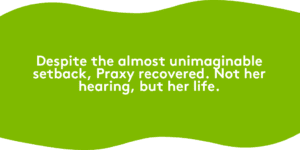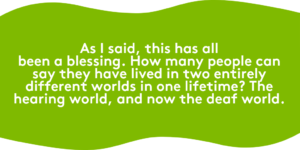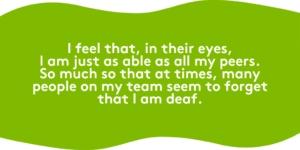Praxy Orduno-Arcia: Ambassador of Inclusion
There are few positions more challenging than Executive Chef. Preparing fantastic meals is only a small part of the job. Praxy Orduno-Archia is also expected to plan menus, budgets, and orders while managing staff from all over the world. The hours are long and the responsibilities immense.
But, for Praxy, it wasn’t quite challenging enough. That’s why, after four years as Traveling Executive Chef for Morrison, she’s taken on additional duties as an Inclusion Ambassador. “I am hoping to open some minds and hearts along the way, by sharing some of my own experiences,” says Praxy.
Those experiences may also explain why Praxy isn’t easily deterred.
“When I was 17 years old,” she begins, “my family and I discovered I had a genetic disease called neurofibromatosis type II. This causes tumors to grow on major nerves in your body, most often the brain. Mine was located on my auditory nerves, causing pressure on my brainstem. I had surgery immediately and lost all hearing in my right ear.
“Ten years later, at 27, I again needed surgery. The tumor had grown and was now life-threatening. It had already begun destroying my facial nerve and auditory nerve and was beginning to cut off my spinal fluids. January 22, 1993, I woke up completely deaf, both auditory nerves severed so that no information from my ears could reach my brain. My facial nerve was damaged, so the left side of my face was paralyzed. This was actually almost harder to accept and overcome than the deafness.”
Despite the almost unimaginable setback, Praxy recovered. Not her hearing, but her life. “This may sound odd, but this has all been a blessing. My life since this experience has been incredible, and I can honestly say this was the best thing that had ever happened to me. If this hadn’t happened, I would have never gone back to school, become a chef, or met my beautiful wife of 22 years. And I wouldn’t be working for Morrison.

“Once in a while, someone has to remind of all that I have accomplished. I get so wrapped up in the now that I forget to look behind me and see how far I’ve come. Being an executive chef, traveling all over the country, has been an amazing gift. Knowing I have the support of my team, my supervisors and my corporate team at Morrison is something that makes me realize that everything I’ve worked for since the morning I woke up not being able to hear, has all been worth it. As I said, this has all been a blessing. How many people can say they have lived in two entirely different worlds in one lifetime? The hearing world, and now the deaf world.”

How have your experiences made you a better chef?
It took me a little while to adjust from my hearing world to this unfamiliar one, of being deaf. I had to learn sign language and learn to deal with my own frustrations and how to cope in this new world. My eyes became my ears, and my patience changed, both for myself and for others. I saw different cultures and different language barriers as something I could now relate. Something I had no experience with before I’d lost my hearing.
When I see my kitchen crew trying to communicate, and I see their frustration, I relate, and I change my own communication modes to meet theirs. And we share much more of ourselves because of that, it strengthens our team.
Due to my inability to hear, I have to “hear” with my eyes. I have to be more aware of my environment than most people. I have had to prove myself in many professional kitchens. I’ve had chefs and workers worry that I would have an accident in the kitchen, due to not being able to hear someone saying, “behind you!” But in reality, someone deaf will probably be more safe, due to their visual attention.
Has Morrison worked with you to help you better contribute to our team?
A former employer could not communicate with me, which had nothing to do with my being deaf. I will do whatever it takes. If we need to physically act it out, so be it. But this employer did not like to repeat herself.
I “listen” by reading lips. Lip reading depends on the context. If I know the context of a conversation, there’s a good chance I’ll be able to catch about 70-percent of what you’re saying. The other 30-percent is pretty much guesswork. Everyone moves their lips differently. Expressions and body language are different. A little time is needed to get used to someone new. I may need someone to repeat themselves or write things down. This former employer did not have the ability to communicate with me and I feel we both missed out on a great deal.
I left that company four years ago and joined Morrison. I have been a Traveling Executive Chef in several Morrison accounts, and just recently moved into my own account in Arizona.
Both Lisa Trombley, Regional Vice President, and Suzanne Schoby, Regional Director of Operations, have been nothing but amazing in the way they support and communicate with me. I feel that, in their eyes, I am just as able as all my peers. So much so that at times, many people on my team seem to forget that I am deaf.

Suzanne did that in Montana while we were opening a new account. We met in the hotel lobby for dinner, but she was downstairs in the lobby, and I was upstairs. She could hear me coming and began talking before I came down, then stared at me, wondering why I wasn’t answering her questions. We both laughed a lot! If I can’t laugh at myself and in these situations, I’d have lost my mind 26 years ago. You need to be able to do that, laugh at yourself, make mistakes, own them, learn from them, and move onward and upward.
If you could change one thing about Morrison, to make it more inclusive, what would it be?
Imagine if you will, being deaf. How do I make a phone call? I use what’s called video relay service (VRS) or IP Relay. An interpreter listens to your voice, and communicates with me using either sign language and a video call interpreting what you say, or by typing to me on my computer like texting but real-time.
Either way, I use my laptop computer to call or video relay the operator. This is where it gets confusing because webinars also use the computer that I am already using to call a relay operator. This means that webinars are extremely complicated for someone deaf and require a lot of planning and two agencies setting up the calls about a week ahead of time. It’s all very frustrating and time-consuming.
My regional team has been supportive from day one, and tries to help in any way they can!





